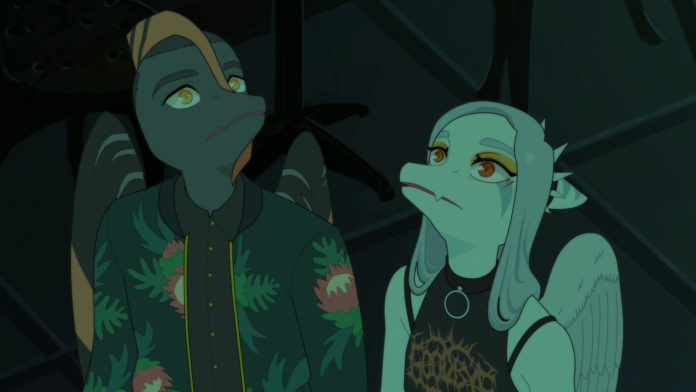It’s not often that I experience a piece of art that feels as tailored to my own lived experiences as Goodbye Volcano High, a game about dinosaur teens trying to chase their dreams and been seen for who they are, as they endure the slow burn trauma of living through the possible incoming extinction of their species.
This game, for all its focus on a fictional world separated from our own by millions of years, feels timely and poignant in its examination of human trauma responses, and insightful on the unique experiences of young trans people struggling to find external validation, in a way that’s going to stick with me for a long time to come.
Goodbye Volcano High is a narrative adventure / music rhythm game, and follows the story of Fang, a non-binary dinosaur (they/them) struggling as they enter their senior year of highschool to chase their dreams of fame as a musician, a career their parents don’t see a future in, while simultaneously struggling with the fact their parents aren’t respecting their new name and pronouns.
Fang feels trapped in a home that doesn’t respect their identity, or their dreams, and is desperate for success in order to escape, in their hopes that fame and a fresh start will bring with it acceptance, and prove they were right about their future being attainable.
If chasing their own dreams wasn’t hard enough, their two bandmates Trish and Reed seem to have their own dreams they’re beginning to chase, pulling them in separate directions.
And then, the news comes.
A meteor is heading toward earth, but don’t worry, it’s statistically likely to pass right by us.
Don’t worry, the percentage chance it hits earth is only rising because we’re narrowing the field of probability as we collect data, it’s still unlikely.
Some scientists are using new models, and they say it’s more likely than we realise.
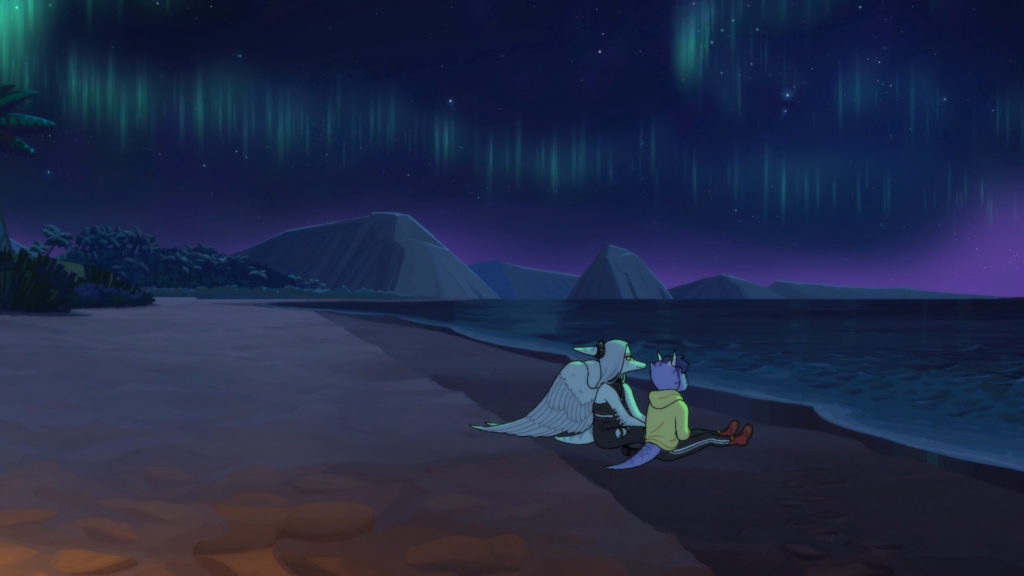
…….
….
..
Goodbye Volcano High’s story is a slow burn exploration of dreams and aspirations, and the ways that teenagers are pressured to settle on a reliable, stable, predictable plan for their adult lives before many of them really understand themselves well enough to know their true passions, skills, or motivations. It explores the ways people grow together, and grow apart, and how major life decisions can often act as breaking points for relationships that feel at the time like they’re going to last forever.
Goodbye Volcano High isn’t a story inherently about gender transition, but the topic is a prominent part of how certain narratives in the game are explored, and I must say I was generally very impressed with how the game’s trans characters are written, and how their transness is woven into the plot, without feeling forced in unnecessarily.
While Fang’s story intersects very clearly with their non-binary status, their journey for parental acceptance mirrors their journey attempting to perform music as a career path, there are other trans characters present, who explore aspects of transness alongside Fang that are rarely discussed at all in media.
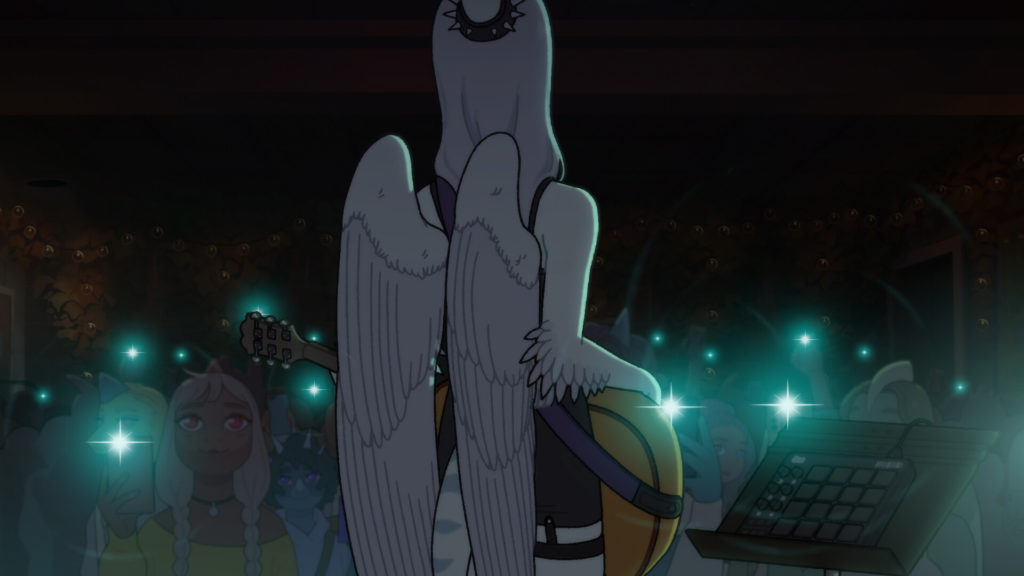
The main one of these characters I want to take some time to discuss is Sage, a feminine presenting trans man who loves pastel pink, baking, and his equally colourful tarot reading friend Stella.
Sage and Fang at one point in the narrative have a really moving conversation, depending on your narrative choices, about the struggles the two share getting approval from their parents post transition. Sage struggles to have his status as a man taken seriously by his parents because of his love of femininity. He enjoys femininity now he’s allowed to engage with it as a choice rather than an expectation, but because he hasn’t leaned into stereotypes of masculinity, he feels unseen. Fang empathises, as a non-binary person not performing masculinity, they feel like their parents don’t see them as having physically changed much since coming out, and Fang worries this is a factor in their being slow to update on name and pronouns.
These two characters share an understanding of the difficulties inherent in getting your trans status taken seriously if you don’t fit an external ideal of expected binary transition.
They assure each other they’re okay.
They don’t owe anybody normal.
For other trans characters, the looming end of the world makes these same topics more pressing. The idea that you can wait around for a few years and hope your parents sort their views out feels pretty different when there’s a potential time limit on your survival.
Confrontations become more necessary.
Goodbye Volcano High’s handling of trans characters isn’t without room for critique, but the criticisms I have feel fairly minor.
Most notable, the game makes the decision to include Fang’s deadname in two scenes, one near the start of the game and one closer to the end. I get why it’s done, it’s there to build to a specific narrative payoff, but I am personally of the belief that you could work to remove the deadname without harming those scenes’ impact on the overall narrative.
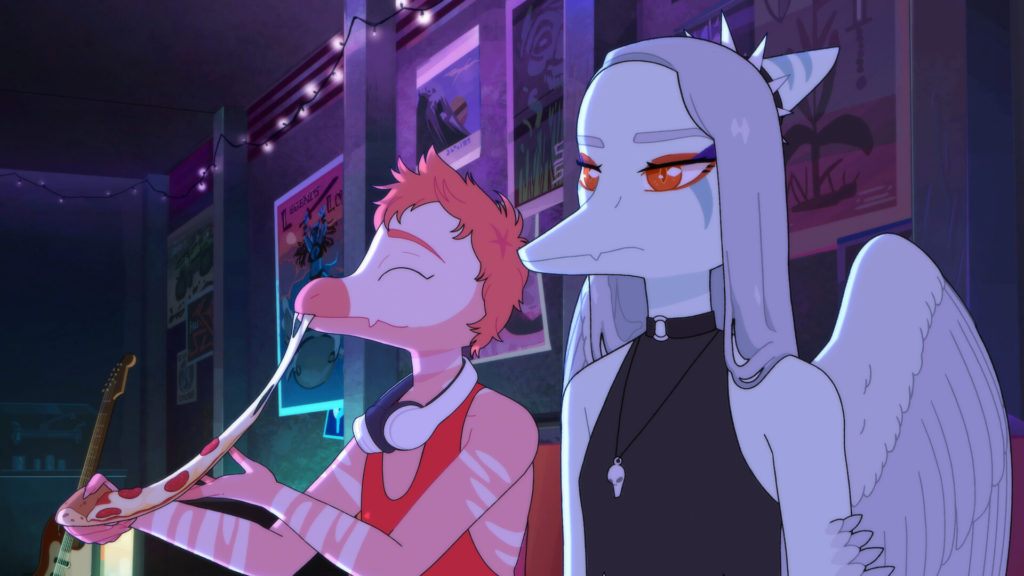
One instance of the deadname, written down, could be scribbled out. The player could hear static in place of the name when spoken aloud. There are ways to make it clear that a deadname was spoken without it being included in the piece of media, and the choice to include it feels like a choice I would have recommended against.
As far as media including deadnames goes I get why this one makes this choice, and don’t hate it in the context of an otherwise very insightful trans story, I just personally feel like it was not necessary to achieve the aims it was going for. Games like Tell Me Why have demonstrated that it’s possible to avoid sharing a character’s deadname, while still making deadnaming clear, and part of a character’s lived experience.
Goodbye Volcano High is, at its core, a story about the trauma of living with an uncertain planetary fate looming over in the distance. While direct parallels can be drawn to fears of the atomic bomb being dropped in decades passed, more modern trauma sources such as climate change, the rise of global fascism, and more modern day threats feels analogous to the way this game’s story examines youth.
It’s hard to wake up every day, and dream of a future that’ll take 20 years of planning and progression to achieve, when the planet might not be able to sustain life within the coming decades.
It’s hard to dream, when you know world changing events are imminent, but you don’t know when they’ll arrive, and how bad they might be when they do.
It’s hard not to be a nihilist when you have to live with the knowledge that there are forces beyond your control that might make your dreams unreachable.
Goodbye Volcano High is a hopeful game. It is a game about continuing to make art, and friendships, and chase your dreams, even if today might be the only day you have. It is a game about finding things to believe in during bleak times, and about riding the line between acknowledging the dire state of the world, but not getting consumed by it.
Goodbye Volcano High’s music rhythm gameplay, while not really something I have really touched on here, is a core part of what makes it work. Tasking the player with managing three different timing based minigames at once to perform music, it acts as something for the player, and Fang as a character, to focus on excelling at. It acts as a challenge to overcome, a milestone of progress, and a dream to follow, in between the conversations where everyone is quietly sitting, not wanting to talk about the fact they are living in unprecedented times.
Having myself gone through trying to become a video game critic, an unattainable sounding job, at the same time as transitioning, and trying to get my parents to respect my identity, before leaping into a world where I was constantly bombarded with dire news about the fate of our world, there’s a lot I find familiar in Goodbye Volcano High. From seeing people handle their trauma through D&D campaigns, to writing music about the things we don’t want to face directly.
Seeing this game’s group of queer friends get through it together, even in their direst days, gave me hope to keep going a little longer.
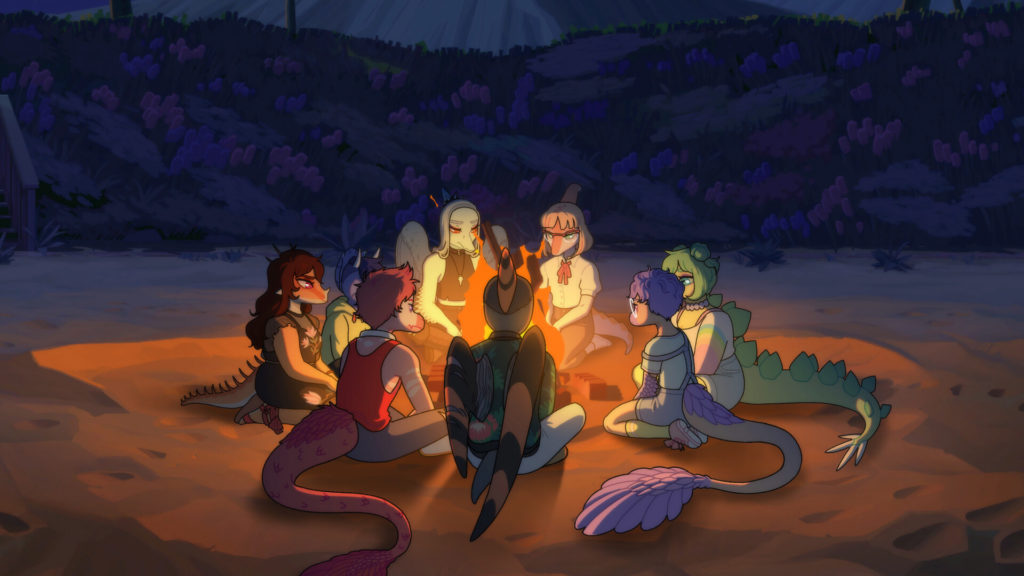
This article was funded by LGBT+ Futures: Equity Fund is a two-year £786,000 partnership between Consortium and The National Lottery Community Fund, designed to help community-led and grassroot organisations supporting some of the most under-represented and marginalised LGBT+ communities. Read more here.

